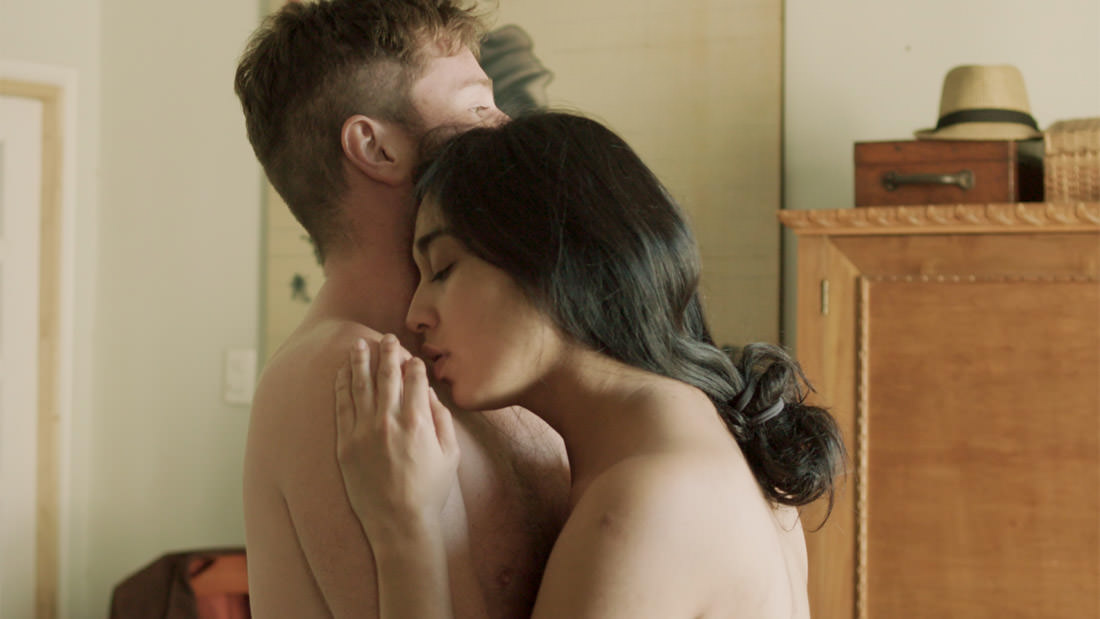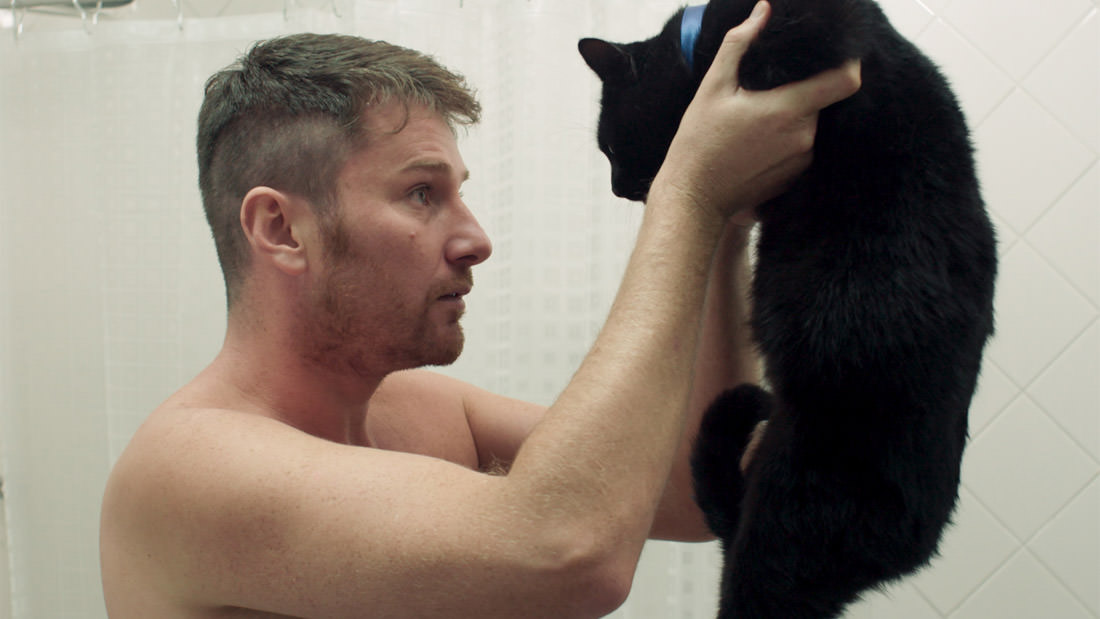House sitting turns into a destructive and morally questionable act in Chilean domestic dramedy Family Life. A couple of intellectuals skip town with their daughter and request the husband’s estranged cousin, Martin (Jorge Becker), to live in their home while they are gone. Rather than transforming the place into a bachelor pad, the seemingly depressed man romances a younger woman and creates a fictional past to seem more like husband material. Humor quickly gives in to painful realizations about modern relationships, whether one chooses a traditional lifestyle or the freedom of singlehood. The film premiered at Sundance last January and just won Best Film at the Miami International Film Festival.
Honoring the drama’s premise, we had a family-style conversation with co-directors Alicia Scherson and Cristián Jiménez, as well as actress Blanca Lewin, who plays intellectual married woman Consuelo, and Gabriela Arancibia, who represents both the younger generation and the working class through her turn as Pachi. Here are the highlights.
On The Contrasting Roles We Play Between Married And Single Life
Alicia Scherson: Martin represents people from our generation that has stayed firm in their idea of not having a family and enjoys freedom in spite of the price of loneliness or isolation. But he is not so sure either, it’s not that he is convinced of this or preaching about it, but he does what he can. When he arrives in this house he has this rough attitude and slowly when he is alone in this house the idea, the warmth, the comfort, and the security of a family home starts seducing him and he starts feeling like having his own family. He embodies that contradiction when he sees that real family that chose security, companionship, and those ties.
Cristián Jiménez: The film shows these two visions about family life. Even if one has chosen one path, with the corner of our eye we are always looking at the possibility of the other road we have renounced. The other choice is always floating and doesn’t stop being an influence.
Alicia Scherson: Martin sets up something like a stage play. He arrives at this house, which is an empty set because the other “actors,” the family, have left. They are gone but left behind the set decorations, props, and costumes, and Martin inhabits this set and being there by himself he feels the urge to act and pretend he is somebody else. That’s a way of looking at the film that we really like. He constructs this fictional story and a fictional family, and that makes us question how real the other family that left really was. The other family is also sort of fictional because we are all performing roles. That’s the beauty of the experiment in this tale, “What would happen if you take on this fictional role and play or pretend until the final consequences?”
Cristián Jiménez: At the same type one could say that Martin’s fiction leads him to a series of emotions truths that are real even if the surface is a lie. The relationship between what’s real and what’s part of the fiction he created is much more complex than simply saying, “This is false” or “This is true.” Yes, the family he created is a staged fiction but it has consequences in him that are completely real.
Alicia Scherson: In contemporary urban life we all play a role. We are here playing the role of filmmakers and you are playing the role of a journalist.

On The Nuclear Family’s Hidden Desires
Blanca Lewin: The family is questioning itself even before Martin arrives. They have taken the decision to travel and we can perceive they have just come out of a marital crisis but have decided to continue on together. However, there are still remnants of that crisis. There are lines of dialogue between the couple in which he blames her for the young daughter’s behavior because of the way she is. There are typical frictions as there are in most marriages. Beyond questioning themselves, Consuelo seems to fantasize about having a life similar to that of Martin and be someone that walks freely through like without any of these responsibilities. It also has to do with the fact that they are a family of intellectuals and want to continue being cool, they don’t want to stop being cool for having a family, and that I think is very interesting. They don’t want to stop being themselves, professionals, probably successful just because they have such a domestic life: taking care of the girl, cooking, etc. On the other hand, Consuelo’s husband tries to be cool but the traditional macho in him comes out, and it’s funny because he also only has a brief moment to have an intimate man-to-man conversation with Martin, while my character is in the kitchen. In this scene he in essence invites Martin to have the life that he doesn’t have. But instead of doing all the things that a single man could do, Martin ends up becomes, at least in fiction, a married man.
On The Many Versions Of The Concept Of Family
Gabriela Arancibia: It’s also about the definition of a family. I think that we as a team are also a family and a different type of family. Each person constructs their nuclear family through his or her own tools and context. For my character, Pachi, her son is her family and that’s it. She lives with her parents and she has projects and dreams, like going to school, and the other family, Consuelo and Bruno, dream of a change of air and going to Paris. I don’t fully understand what being a family is, I don’t think there is model. There are many types and versions of family.
Alicia Scherson: Pachi has her own version of a family, which is comprise of her and her son, but at the same time she clings to Martin, who, because of the lie he has build, seems like stable oak. She sees him as a tree where she can sit to rest from the complex life of being a single mother and solving problems. The film is in between these polar opposites, but never chooses one of them. The idea is for the spectator to ponder both of these contemporary options of family and see that neither of them is complete satisfying. After we hit 40 we are condemned to live in that contradiction forever.
On The Way His Generation Confronts Life Choices
Crisitán Jiménez: People who don’t have a family are judged, but they are slowly being less and less judged because of that. This generation, of which the film talks about, people like us who are in their 40s and who were born in the 70s, is a generation that for the first time has been confronted with living their lives in a much more individualist manner where one has to make decisions: to have or not have a family, to have a stable job or be a freelancer. For our parents generation, even those who were sort of liberal, somewhere between 20 and 25 they would get married and have children without thinking much about it. Everyone was looking for job security and having a contract. Out generation is the one that’s learning to live in a different way and suffering the consequences of the flexible economy we have today. This means we have to make choices that are sometimes difficult and that forces us to think about how we want to live our lives instead of just jumping into living the same way everyone is supposedly doing it.

On Sticking To The Screenplay And Focusing On Dialogue
Crisitán Jiménez: There is not a lot of improvisation. I don’t think Alicia nor I use it much in the films we have done separately, but that also doesn’t mean that the screenplay is set in stone or that nothing can be changed. Once you get on set there are things that work and things that don’t, there are some flexible points, but in general we work with the screenplay as a clear guide. We work a lot in preparing the actors, it’s not like they get to the set and have to start searching there how to play the part. S
Alicia Scherson: We really like working with dialogue. Although Alejandro Zabra wrote the screenplay, we collaborated with him. We were three writers finessing the dialogue. We really like working to fine very specific words. If it’s an oak it’s an oak, it’s not a willow.
On Pachi Representing The Generational And Class Divide
Gabriela Arancibia: We always look at what the others have. When you have something you always want something different. Obviously, meeting a man that has a more stable situation, or so she thinks, makes it seems like Pachi was very interested in that aspect, but there are also tender and sweet moments in the relationship she develops with martin. When I read the screenplay, I thought she was a woman that was very well depicted in relation to how women around that age are in Chile. They are empowered, nonchalant, and with a big personality, and I really liked that about her.
Alicia Scherson: Pachi is a younger character, and there is a contrast between the generation of those in their 40s and those in their 20s and 30s, even in the way she relates to sex. Even though the film centers in the other generation in their 40s, she is a counterpoint because she is very relaxed and who doesn’t bite her tongue. At first she might seem a bit opportunistic and interested in the house and material things, but then we have a scene in which she tells him, “You are not normal.” She realizes that this guy, who might have seemed like the perfect husband, is a strange bug. But she likes him even with that strangeness.

On What’s Specifically Chilean About This Universal Premise
Alicia Scherson: It’s a very local story, but that speaks about intergenerational issues regarding people in their 40s that is very universal. At the same time, it’s a very Chilean movie that is set in a peculiar neighborhood, there are elements about social class, there are some subtleties about who are these characters and why they live there, that might appear in the same way if the film took place somewhere else. This is a neighborhood that is being gentrified and there is this sort of snobbish attitude from the homeowners. There is also a class divide between Pachi and the other characters, which is shown in the way she dresses. There are these subtleties that are idiosyncratic, some might translate and some might not.
Blanca Lewin: There is a joke in the film that doesn’t seem to work in the US but it does in Chile. When Pachi tells Martin that she was born in a democracy. She says, “I was born in a democracy, so I had sex-ed.” For us that’s very telling. Those who were born during the dictatorship and those born in democracy are tow completely different generations. Those who grew up in the dictatorship are very different to those that were born once we had a democracy. They are different in the way they confront life, what they are afraid of, and in Chile that is very evident between these two generations. People here might think that line of dialogue doesn’t mean much, but it’s very idiosyncratic of Chile. Pachi is much more uninhibited because she was born in democracy. For us, there was so much repression that even if now the dictatorship ended, that has marked the way we confront life. We fight with our self-censorship and self-repression, and that generation born in democracy doesn’t experience that. They are much more freer than us.







